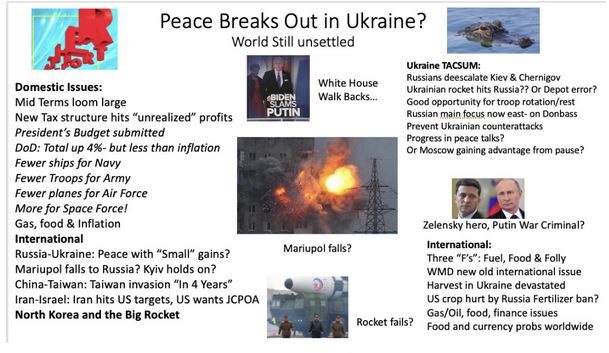Weather Report: Balkan Branches and Sequels?

It was an interesting week and we are only at the Camel Day hump! There are reports that Peace may be on the verge of breaking out in Ukraine. Socotra House no longer has access to classified information, though, and we have to rely on the opposing narrative lines in the propaganda end of the conflict to identify real facts.
They are fascinating. Amid talks of negotiations, there was a report of a Ukrainian advanced rocket hitting a russian ammo depot inside Russian territory. The narratives battle, as some reports describe it as an error inside the depot in handling their own munitions. Other possibly significant information is uttered and then “walked back” in corrective press releases without attribution. The consensus view is that the Russians are taking a step back from aggressive forward motion.
Opinion on the “why” is mixed. Casualties range from “heavy” to “grave,” depending on which sources we prefer. The numbers of Russian troops killed in action in the fighting range from five to fifteen thousand young soldiers and an uncommon number of senior officers. Ground combat has been in progress for a month and a “strategic pause” appears necessary to re-supply and conduct troop rotations before retreating or continuing operations. As afternoon crosses the Balkans now, the news reports continued skirmishing that bely the news of peace.
To that end, the strategic town of Mariupol has been under significant assault even as talk of peace is leaking out. The town is on the Sea of Azov, located just east of a smaller Ukrainian town much more famous. A resort city known as Yalta, where the fate of Germany was once decided under the agreed term of “Unconditional Surrender.” That decision had branches and sequels that eliminated the place Clausewitz called home.
All of us here at the Fire Ring are encouraged that the threat of nuclear exchange may have diminished. Long ago, some of us have planned nuclear strike missions that were never never executed. We have an idea of the modern horrors that could be released in a single event, much less the specter of mass devastation inherent in a larger exchange of weapons. If this is a pause of any sort, it is a good and hopeful thing.
But there are what we used to call “Branches and Sequels” to the events that have already occurred. Those are technical terms describing the cascade of consequence from events already committed to history. There are some apparent already and they spread far beyond the Balkan cockpit of current action.
DeMille was a nuclear-trained engineer and operated in the shadow world of the Cold War. He mentioned to the group that when he attended the War College- think how quaint those two words are today- he was reminded of the thoughts of Prussian General Carl von Clausewitz. He defined the art of combat conducted against the martial genius of Napoleon. One of the terms Clausewitz used was “Friction,” a factor in which a muddy road might delay an attacking force, slowing it from a moving agent of victory to a static target in defeat. And the product of that Friction in combat leads to Branches and Sequels no one would have chosen but determine the course of the history in which we will live.
Branches and Sequels today? There are reports that the Russian failure to execute a lightning victory is causing reassessment of courses of action elsewhere. Like many, we have attempted to assess the likelihood of a Chinese attempt to settle the Taiwan Question. Late reporting suggests the Russian experience has delayed a Chinese movement against the island by four years. That is a number of uncertain provenance. Some of us may not survive to ascertain its accuracy. Decisions made now will produce their own branches in history, even as the North Koreans have demanded attention with a giant rocket that may (or may not) have proven a capability for intercontinental mischief.
This group of old warriors prefers peace. But there is wisdom older than von Clausewitz on that subject. The Romans were adept at maintaining a vast empire, and peace was a valued state of affairs. They did not share the terms we know, but summarized it nicely. In Latin, the phrase was “Igitur qui desiderat pacem, praeparet bellum.”
It makes sense to us. If you want peace, be prepared to fight for it. Otherwise, there could be some branches in the road we travel and some sequels that could be painful indeed.
Copyright 2022 Vic Socotra
www.vicsocotra.com
